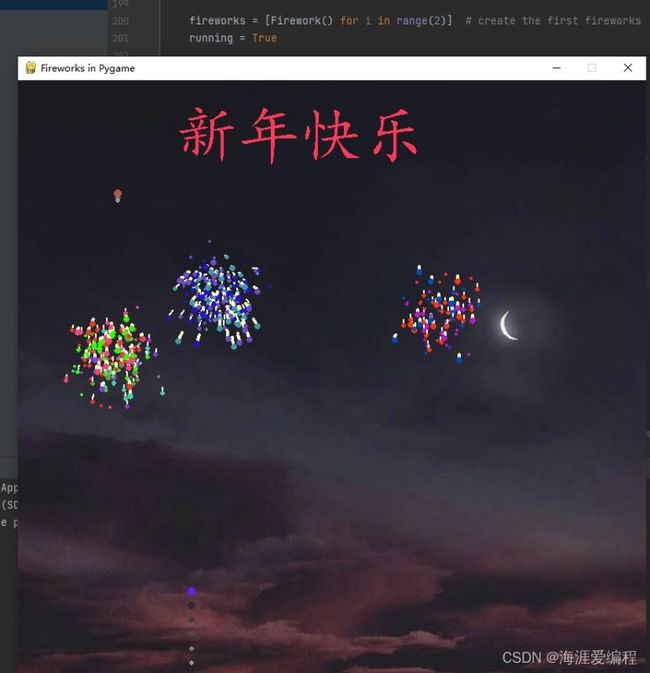先介绍下 Pygame 绘制烟花的基本原理,烟花从发射到绽放一共分为三个阶段:
1,发射阶段:在这一阶段烟花的形状是线性向上,通过设定一组大小不同、颜色不同的点来模拟“向上发射” 的运动运动,运动过程中 5个点被赋予不同大小的加速度,随着时间推移,后面的点会赶上前面的点,最终所有点会汇聚在一起,处于 绽放准备阶段;
2,烟花绽放:烟花绽放这个阶段,是由一个点分散多个点向不同方向发散,并且每个点的移动轨迹可需要被记录,目的是为了追踪整个绽放轨迹。
3,烟花凋零,此阶段负责描绘绽放后烟花的效果,绽放后的烟花,而在每一时刻点的下降速度和亮度(代码中也叫透明度)是不一样的,因此在代码里,将烟花绽放后将每个点赋予两个属性:分别为重力向量和生命周期,来模拟烟花在不同时期时不同的展现效果。
程序运行截图:
完整程序代码:
import pygame
from random import randint, uniform, choice
import math
vector = pygame.math.Vector2
gravity = vector(0, 0.3)
DISPLAY_WIDTH = DISPLAY_HEIGHT = 800
trail_colours = [(45, 45, 45), (60, 60, 60), (75, 75, 75), (125, 125, 125), (150, 150, 150)]
dynamic_offset = 1
static_offset = 3
class Firework:
def __init__(self):
# 随机颜色
self.colour = (randint(0, 255), randint(0, 255), randint(0, 255))
self.colours = (
(randint(0, 255), randint(0, 255), randint(0, 255)),
(randint(0, 255), randint(0, 255), randint(0, 255)),
(randint(0, 255), randint(0, 255), randint(0, 255)))
self.firework = Particle(randint(0, DISPLAY_WIDTH), DISPLAY_HEIGHT, True,
self.colour) # Creates the firework particle
self.exploded = False
self.particles = []
self.min_max_particles = vector(100, 225)
def update(self, win): # called every frame
if not self.exploded:
self.firework.apply_force(gravity)
self.firework.move()
for tf in self.firework.trails:
tf.show(win)
self.show(win)
if self.firework.vel.y >= 0:
self.exploded = True
self.explode()
else:
for particle in self.particles:
particle.apply_force(vector(gravity.x + uniform(-1, 1) / 20, gravity.y / 2 + (randint(1, 8) / 100)))
particle.move()
for t in particle.trails:
t.show(win)
particle.show(win)
def explode(self):
# amount 数量
amount = randint(self.min_max_particles.x, self.min_max_particles.y)
for i in range(amount):
self.particles.append(Particle(self.firework.pos.x, self.firework.pos.y, False, self.colours))
def show(self, win):
pygame.draw.circle(win, self.colour, (int(self.firework.pos.x), int(self.firework.pos.y)), self.firework.size)
def remove(self):
if self.exploded:
for p in self.particles:
if p.remove is True:
self.particles.remove(p)
if len(self.particles) == 0:
return True
else:
return False
class Particle:
def __init__(self, x, y, firework, colour):
self.firework = firework
self.pos = vector(x, y)
self.origin = vector(x, y)
self.radius = 20
self.remove = False
self.explosion_radius = randint(5, 18)
self.life = 0
self.acc = vector(0, 0)
# trail variables
self.trails = [] # stores the particles trail objects
self.prev_posx = [-10] * 10 # stores the 10 last positions
self.prev_posy = [-10] * 10 # stores the 10 last positions
if self.firework:
self.vel = vector(0, -randint(17, 20))
self.size = 5
self.colour = colour
for i in range(5):
self.trails.append(Trail(i, self.size, True))
else:
self.vel = vector(uniform(-1, 1), uniform(-1, 1))
self.vel.x *= randint(7, self.explosion_radius + 2)
self.vel.y *= randint(7, self.explosion_radius + 2)
# 向量
self.size = randint(2, 4)
self.colour = choice(colour)
# 5 个 tails总计
for i in range(5):
self.trails.append(Trail(i, self.size, False))
def apply_force(self, force):
self.acc += force
def move(self):
if not self.firework:
self.vel.x *= 0.8
self.vel.y *= 0.8
self.vel += self.acc
self.pos += self.vel
self.acc *= 0
if self.life == 0 and not self.firework: # check if particle is outside explosion radius
distance = math.sqrt((self.pos.x - self.origin.x) ** 2 + (self.pos.y - self.origin.y) ** 2)
if distance > self.explosion_radius:
self.remove = True
self.decay()
self.trail_update()
self.life += 1
def show(self, win):
pygame.draw.circle(win, (self.colour[0], self.colour[1], self.colour[2], 0), (int(self.pos.x), int(self.pos.y)),
self.size)
def decay(self): # random decay of the particles
if 50 > self.life > 10: # early stage their is a small chance of decay
ran = randint(0, 30)
if ran == 0:
self.remove = True
elif self.life > 50:
ran = randint(0, 5)
if ran == 0:
self.remove = True
def trail_update(self):
self.prev_posx.pop()
self.prev_posx.insert(0, int(self.pos.x))
self.prev_posy.pop()
self.prev_posy.insert(0, int(self.pos.y))
for n, t in enumerate(self.trails):
if t.dynamic:
t.get_pos(self.prev_posx[n + dynamic_offset], self.prev_posy[n + dynamic_offset])
else:
t.get_pos(self.prev_posx[n + static_offset], self.prev_posy[n + static_offset])
class Trail:
def __init__(self, n, size, dynamic):
self.pos_in_line = n
self.pos = vector(-10, -10)
self.dynamic = dynamic
if self.dynamic:
self.colour = trail_colours[n]
self.size = int(size - n / 2)
else:
self.colour = (255, 255, 200)
self.size = size - 2
if self.size < 0:
self.size = 0
def get_pos(self, x, y):
self.pos = vector(x, y)
def show(self, win):
pygame.draw.circle(win, self.colour, (int(self.pos.x), int(self.pos.y)), self.size)
def update(win, fireworks):
for fw in fireworks:
fw.update(win)
if fw.remove():
fireworks.remove(fw)
pygame.display.update()
def main():
pygame.init()
pygame.font.init()
pygame.display.set_caption("Fireworks in Pygame") # 标题
background = pygame.image.load("img/1.png") # 背景
myfont = pygame.font.Font("img/simkai.ttf",80)
myfont1 = pygame.font.Font("img/simkai.ttf", 30)
testsurface = myfont.render("新年快乐",False,(251, 59, 85))
testsurface1 = myfont1.render("By:Python代码大全", False, (251, 59, 85))
# pygame.image.load("")
win = pygame.display.set_mode((DISPLAY_WIDTH, DISPLAY_HEIGHT))
# win.blit(background)
clock = pygame.time.Clock()
fireworks = [Firework() for i in range(2)] # create the first fireworks
running = True
while running:
clock.tick(60)
for event in pygame.event.get():
if event.type == pygame.QUIT:
running = False
if event.type == pygame.KEYDOWN: # Change game speed with number keys
if event.key == pygame.K_1: # 按下 1
fireworks.append(Firework())
if event.key == pygame.K_2: # 按下 2 加入10个烟花
for i in range(10):
fireworks.append(Firework())
win.fill((20, 20, 30)) # draw background
win.blit(background,(0,0))
win.blit(testsurface,(200,30))
win.blit(testsurface1, (520,80))
if randint(0, 20) == 1: # create new firework
fireworks.append(Firework())
update(win, fireworks)
# stats for fun
# total_particles = 0
# for f in fireworks:
# total_particles += len(f.particles)
# print(f"Fireworks: {len(fireworks)}\nParticles: {total_particles}\n\n")
pygame.quit()
quit()
main()
到此这篇关于Python新年炫酷烟花秀代码的文章就介绍到这了,更多相关Python新年烟花秀内容请搜索脚本之家以前的文章或继续浏览下面的相关文章希望大家以后多多支持脚本之家!
